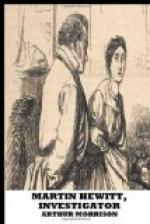The cabbies looked at one another and shook their heads; it chanced that none of them had been on that particular rank at that time. But the waterman said: “’Old on—I bet ’e’s the bloke wot old Bill Stammers took. Yorkey was fust on the rank, but the bloke wouldn’t ’ave a ’ansom—wanted a four-wheeler, so old Bill took ’im. Biggish chap in a long black coat, collar up an’ muffled thick; soft wide-awake ’at, pulled over ’is eyes; and he was in a ’urry, too. Jumped in sharp as a weasel.”
“Didn’t see ’is face, did ye?”
“No—not an inch of it; too much muffled. Couldn’t tell if he ’ad a face.”
“Was his arm in a sling?”
“Ay, it looked so. Had it stuffed through the breast of his coat, like as though there might be a sling inside.”
“That’s ’im. Any of ye tell me where I might run across old Bill Stammers? He’ll tell me where my precious bilker went to.”
As to this there was plenty of information, and in five minutes Martin Hewitt, who had become an unoccupied cabman for the occasion, was on his way to find old Bill Stammers. That respectable old man gave him full particulars as to the place in the East End where he had driven his muffled fare on Saturday, and Hewitt then begun an eighteen, or twenty hours’ search beyond Whitechapel.
* * * * *
At about three on Tuesday afternoon, as Nettings was in the act of leaving Bow Street Police Station, Hewitt drove up in a four-wheeler. Some prisoner appeared to be crouching low in the vehicle, but, leaving him to take care of himself, Hewitt hurried into the station and shook Nettings by the hand. “Well,” he said, “have you got the murderer of Rameau yet?”
“No,” Nettings growled. “Unless—well, Goujon’s under remand still, and, after all, I’ve been thinking that he may know something——”
“Pooh, nonsense!” Hewitt answered. “You’d better let him go. Now, I have got somebody.” Hewitt laughed and slapped the inspector’s shoulder. “I’ve got the man who carried Rameau’s body away!”
“The deuce you have! Where? Bring him in. We must have him——”
“All right, don’t be in a hurry; he won’t bolt.” And Hewitt stepped out to the cab and produced his prisoner, who, pulling his hat farther over his eyes, hurried furtively into the station. One hand was stowed in the breast of his long coat, and below the wide brim of his hat a small piece of white bandage could be seen; and, as he lifted his face, it was seen to be that of a negro.
“Inspector Nettings,” Hewitt said ceremoniously, “allow me to introduce Mr. Cesar Rameau!”
Netting’s gasped.
“What!” he at length ejaculated. “What! You—you’re Rameau?”
The negro looked round nervously, and shrank farther from the door.
“Yes,” he said; “but please not so loud—please not loud. Zey may be near, and I’m ’fraid.”
“You will certify, will you not,” asked Hewitt, with malicious glee, “not only that you were not murdered last Saturday by Victor Goujon, but that, in fact, you were not murdered at all? Also, that you carried your own body away in the usual fashion, on your own legs.”




